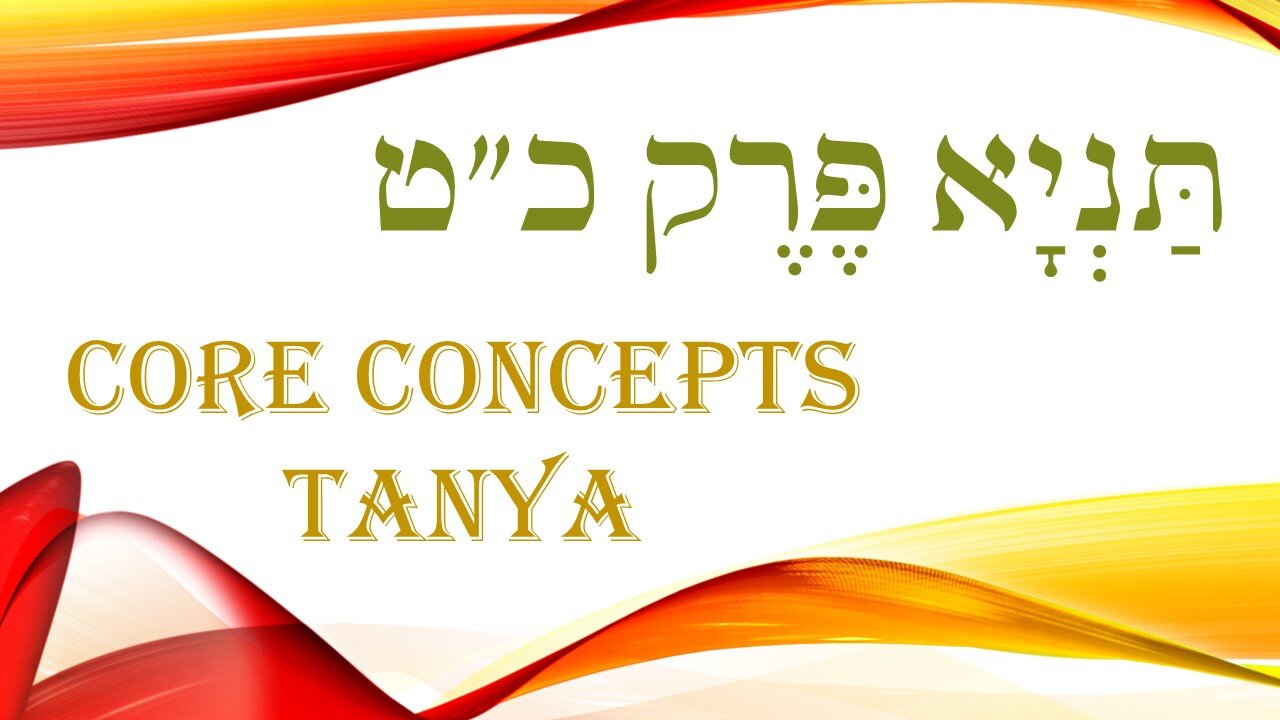Premium Only Content

Core Concepts Tanya: Chapter 29
Brief recap of Chapter 29:
1. Chapter 29 addresses a new concern in dealing with situations which may impede our joy in service of Hashem; "timtum halev," "dullness of the heart."
In short, I'm doing what I'm supposed to, I pray, I learn Torah, I do mitzvot, so why am I not feeling anything? Why isn't the enduring light and fire of G-dliness penetrating my heart?
2. Davening is called "service of the heart."
(a) It happens in the heart, as it's a time for us to focus on bringing our intellect into the realm of emotions, as discussed in previous chapters.
(b) The heart is the focus of this service, a time to transform and redirect the desires of the heart toward holy ends.
So what if I'm praying as I should, but still not feeling it?
3.What happens when a drain backs up?
Usually, there's some sort of blockage preventing it from working properly.
The answer isn't to flood the drain but to remove or destroy the blockage.
Tanya teaches this is the way to overcoming "dullness of the heart."
The reason someone might not be "feeling it," even when doing everything right, is because indulgence in material pleasures has created a "blockage" preventing the light of the G-dly soul from shining through and affecting the body and animal soul.
"This soul which You gave within me is pure," we see our G-dly souls as something apart from ourselves, something that was put into us. When we speak of ourselves, we're usually referring to our body and animal soul.
A tzaddik, however, sees himself as a G-dly soul and his body and animal soul as something apart from his real self.
4. We have to set times to humble ourselves if we are to break through this blockage.
If a wooden beam won't catch fire, it has to be splintered. A log that’s too big won't burn, rather, it must be broken up first and then it can catch fire. This is how we humble ourselves, by reminding ourselves of how controlled we are by our body and animal soul's desires.
Negative sources soar upward and overshadow spirituality, and the way to overcome that is by bringing them down.
5. We've set aside time to humble ourselves, we remind ourselves of past sins and indiscretions, yet we're still not feeling closer to G-d. Why isn't this repentance/return/reconnection working?
(a) Our efforts are not accepted.
Anything we did yesterday was good for yesterday, today is a new day and whatever steps forward we took are no longer enough for where we are today. We must do more.
(b) We need to dig deeper, which will allow us to rise even higher.
Our current efforts may not be deemed enough compared to what we're capable of, so we need to dig deeper and try harder.
6. How do we bring down the negative elements? How do we break through so the light of G-dliness shines through?
By "raging" at the darkness.
We learn this from the story of the spies Moshe sent from the desert to check out the Land of Israel. They came back and claimed that the land and people are stronger than G-d and so they were unconquerable. Whereupon, Hashem "raged" at them, and punished that generation by having them die off in the desert so they wouldn't enter the land. Once Moshe told the people Hashem was upset, they came back to their senses and were believers again.
How could they change so quickly? No miracle occurred, no sign was shown, what happened?
The "rage" cut through the negative forces so the belief of their G-dly souls once more prevailed.
This is how we "rage" at the negative forces, temptations, desires, calling them out for what they are. "You're wicked, evil, despicable, abominable! How long will you try to deny the truth? How long will you pretend to be something when we know all is nothing before Hashem?!"
7. Why will this work?
Because sitra achara and klipah are like darkness, and darkness has no substance.
How do you get rid of darkness? With a tiny flame.
You don't need to push, pull, kick, or chop, just shine light and it goes away.
Our "rage" is the driving force that dispels this darkness, it brings the negative forces down from their arrogant heights so they can be exposed for what they truly are, a force Hashem created to challenge us, specifically to overcome it!
8. The Zohar tells us we should be a "Master of Account."
The specific use of master instead of servant or clerk is because a master most acutely feels every profit and every loss. This is how we take a personal account of ourselves and actions.
-
 LIVE
LIVE
The StoneZONE with Roger Stone
1 hour agoAfter Years of Targeting Trump, FBI and DOJ are Unprepared to Stop Terror Attacks | The StoneZONE
1,193 watching -
 LIVE
LIVE
Josh Pate's College Football Show
5 hours agoPlayoff Reaction Special: Ohio State Owns Oregon | Texas Survives | UGA vs Notre Dame Takeaways
34 watching -
 58:04
58:04
Kimberly Guilfoyle
4 hours agoFBI's Terror Response Failures, Live with Steve Friend & Kyle Seraphin | Ep. 185
65.6K34 -
 2:15:01
2:15:01
WeAreChange
5 hours agoMassive Developments In Vegas Investigation! UNREAL DETONATION, Shocking Details Emerge!
66.9K16 -
 54:02
54:02
LFA TV
12 hours ago2025 Is Off to a Violent Start | TRUMPET DAILY 1.2.25 7pm
5.71K -
 DVR
DVR
theDaily302
11 hours agoThe Daily 302- JJ Carrell
5.68K2 -
 2:57
2:57
EvenOut
1 day ago $0.66 earnedTHE TELEPORTING PORTA POTTY TWIN RPANK!
12.3K -
 1:02:55
1:02:55
In The Litter Box w/ Jewels & Catturd
1 day agoAmerica Is Under Attack! | In the Litter Box w/ Jewels & Catturd – Ep. 711 – 1/02/2025
78.5K110 -
 1:45:25
1:45:25
The Quartering
7 hours agoHuge Update In Cybertruck Attack & Dark New Details From New Orleans Attacker & More!
113K60 -
 16:04
16:04
Tundra Tactical
2 days ago $2.21 earnedHow Palmetto State Armory got so BIG!
46.6K6